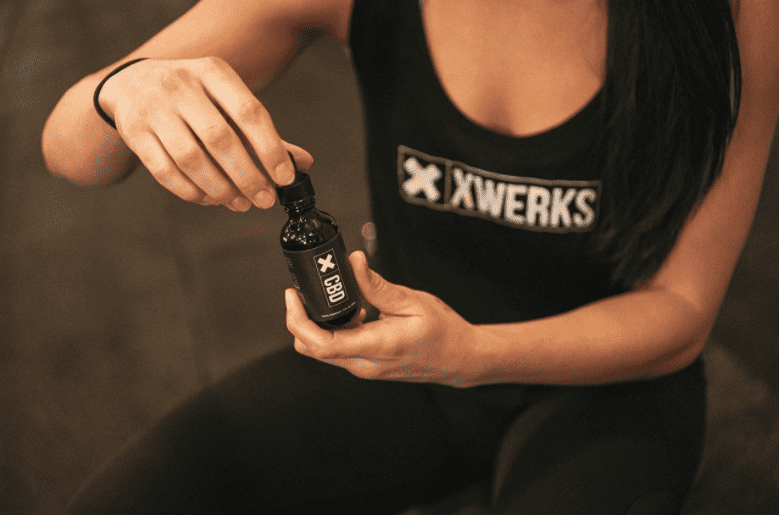
CBD oil is just one of the dozens (hundreds, really) of natural chemicals that occur in the cannabis plant – which is more popularly known as marijuana. The full name is cannabidiol, and it actually belongs to a class of similar chemicals called cannabinoids. It is not to be confused with the very active chemical for which cannabis plant is well-known: THC, which stands for tetrahydrocannabinol. This is the ingredient (for the most part) that is responsible for the “high” for which marijuana/cannabis is known. CBD does not induce this euphoric feeling because it doesn’t chemically bind to the relevant receptors that are responsible for psychoactivity in the human brain. This means that the oil extract or form of cannabidiol, CBD oil, is not psychoactive and can be used purely for the palliative effects without fear of abuse.
Going a bit more in-depth, we find that CBD stems specifically from the hemp plant incarnation of marijuana. After testing all of the hundreds of different naturally-occurring chemicals in hemp/marijuana, the World Health Organization’s Expert Committee on Drug Dependence published a 2017 report certifying that CBD is not habit-forming. As a result, CBD oil does not need to be regulated after the fashion of other on-market drugs (generally). In fact, the exact scope of the legal status varies by state.
Although CBD in its oil and capsule form is legal in all 50 states, the parameters of restriction vary by state. Pervasively (within the United States, at least), the Food & Drug Administration has allowed studies involving non habit-forming cannabinoids ever since the year 2015 – albeit with a few restrictions of the scope of such studies; dealing primarily with the allowed dosage and thus potency. Just a few years later in 2018, however, even these few restrictions were further relaxed as the results from the trials came back and certified that there have been no recorded adverse effects stemming from the usage of pure CBD oil and other forms. The legal mandate, named the Farm Bill, was passed in 2018 and certified the legality of hemp/marijuana – from which the cannabinoids and, specifically cannabidiol, are extracted.
What, Exactly, Does the Farm Bill Mean for CBD Oil?
The so-called Farm Bill of 2018 effectively took CBD oil off the Controlled Substances Acts list; a list that restricts the legal usage of all the substances on it. More specifically, it is hemp that was removed from the CSA list, thereby effectively decriminalizing the use of substances that are derived from hemp – of course, if these substances are combined with other substances still on the CSA list, they are considered illegal. Fortunately, this is not the case with cannabidiol-derived oils that are used as remedies to ailments.
Moreover, the removal of hemp-derived substances from the Controlled substances Acts list means that you can obtain CBD oil much more easily than before – neither you nor your supplier needs to have a license to distribute medical marijuana in most states. Due diligence is required on your part to check your local state laws regarding medical marijuana and associated products, however.
Does Cannabidiol Oil Possess Health Benefits?
The answer to whether CBD oil (and other forms that can be taken) is beneficial for your health is a resounding yes. The scope of this is the only thing in question, as it depends on a variety of factors. For example, in one study where pure CBD was used to combat rheumatoid arthritis, a gendered group of both men and women were given either cannabidiol or a placebo. Ultimately, the medical trial showed that although both the men and the women benefited from the CBD dosage that was given, it was more effective at treating the arthritis in the men. More studies need to be done to gauge why, but it likely has something to do with the testosterone or estrogen differences in men and women, and the way in which cannabidiol may interact with these hormones. In the meantime, let’s take a look at some of the studies that have returned conclusive results on the efficacy of CBD.
1. CBD Studies Involving Insomniacs:
Insomnia is a perhaps surprisingly pervasive issue among Americans, with nearly 70% self-reporting that they have problems sleeping the full recommended eight hours. This data was compiled by the Sleep Foundation. Increasingly, more Americans are taking cannabidiol to help with this, primarily because of its ability to decrease anxiety and improve sleep patterns. Most of the cannabis products on the market do not contain the psychoactive THC form, but rather, focus on the non habit-forming CBD; but to be certain that the percentage of THC is negligible or non-existent, CBD oil is the best of the available options.
It is important to note that most of the studies done to date have been on sleep disorders that do not stem from cancer-related causes. Many studies have been performed on this so we won’t quote them all, but an aggregate result is that nearly 70% of insomniac patients who took CBD reported improved sleep patterns lasting at least a month.
2. CBD Specifically for Anxiety:
Cannabidiol is perhaps most well-known for its ability to help tackle anxiety. In fact – as seen in the above – this is one of the factors it helps assuage for insomniacs. Quite separate from sleeplessness, however, CBD has been shown to dramatically reduce anxiety in people; particularly men. The seminal study was performed on a group of men, with follow-up studies done on women that showed it is effective for both genders.
As for the initial anxiety study, 57 men were given various dosages of CBD: 150 mg, 300 mg and 600 mg, before a simulated public speaking trial that was proven to increase anxiety dramatically (that is, the speaking test was confirmed to do this to a population of men tested prior). The results were as follows: the 150 mg dosage had little to no effect. The 300 mg dosage dramatically reduced the anxiety felt, and the large 600 mg had no discernible effect. The conclusion from that study is evident: too little or too much CBD has no effect on anxiety levels; but the “moderate” dosage is the proverbial sweet spot. It is likely that the human body (men, in particular) releases hormones to counteract the excess cannabidiol, since anxiety is, after all, a necessary response to perceived stimuli (as deemed by the human body).
3. The Effects of CBD on Addiction:
Specifically, we’ll be taking a look at the effect of CBD on addictions due to opiates, alcohol, THC-infused cannabis and the general class of stimulants. It is important to note that cannabidiol, by itself (as opposed to the psychoactive tetrahydrocannabinol or THC) is not at all addictive, despite its association with cannabis. CBD is one of the hundreds of chemicals comprising hemp/cannabis that are not addictive by themselves. The research arm of the World Health Organization actually funded a study showing the above assertion to be apparent, in that, unlike THC, CBD did not induce elevated heart rates, blood pressure or induce states of euphoria in the people tested.
As for the ability of CBD to help treat addictions; the results are positive. A patient trial and study performed in 2015 showed that cannabidiol can potentially be used to treat marijuana addiction (again, THC is the active ingredient in addiction) as well as nicotine addiction from cigarettes and tobacco. The name of the study found in the US National Library of Medicine of the National Institutes of Health is “Cannabidiol as an Intervention for Addictive Behaviors: A Systematic Review of the Evidence”. Of the 14 studies on CBD and addiction done to that date, 5 of them were done on humans, and the results were highly suggestive that cannabidiol has therapeutic effects on reforming addictions to psycho-stimulants as powerful as cocaine. Furthermore, it can beneficially hamper the cravings that addicts would otherwise possess for alcohol, opiates and other specified stimulants.
4. CBD for Chronic Pain Management:
Cannabidiol does not claim to be a palliative for all types of pain; in fact, the studies done for pain management have been specifically for pain of the non-cancer variety. However, when it comes to the aches and pains associated with chronic issues such as arthritis, CBD oil has been proven to assuage the joint inflammation that is the genesis of this. The evidence is pervasive, and can be seen in the studies recorded in the European Journal of Pain. The CBD doesn’t even need to be taken intravenously; topical application of CBD oil through the skin has rendered palliative effects in lower back pain and elsewhere due to rheumatoid arthritis.
Far from being relegated to pain caused by arthritis, CBD has also shown promise in helping to manage neuropathic pain that results from a variety of other non-cancer related causes. The cannabidiol can be taken either orally or through topical application, depending on the progenitor of the pain. Indeed; even chronic pain resulting from an incurable autoimmune issue such as multiple sclerosis has been managed through the use of cannabidiol; the CBD is able to chemically link up with the relevant neuropathic pathways to ultimately reduce the pain cause by the misfiring neurons.
Similarly, CBD also works well to assuage the pain associated with spinal nerve inflammation. The latter eventually causes, if unmanaged, the nerves that communicate with the brain to break down. The resulting neuropathic pain is otherwise hard to treat, but CBD has shown much progress as a simple measure to dramatically reduce the pain. The most relevant medical paper on the matter was published in the Journal of Experimental Medicine “Cannabinoids suppress inflammatory and neuropathic pain by targeting ?3 glycine receptors”. More studies have been done since then, but this 2012 research is the seminal work that laid the groundwork.
Lastly, although CBD is touted as being effective for many types of pain excluding that of the cancer-related variety, this conservative claim is perhaps a bit too conservative. The fact is that cannabidiol has been found to be effective for some types of cancer-related pain. The most noteworthy point here, insofar as application is concerned, is that CBD introduced intravenously was preferred over topical CBD oils for the much more robust cancer-induced types of pain. More studies are being conducted.
Are There Any Concerns With CBD Oils?
The Food and Drug Administration removed hemp from the Controlled Substances Acts list, thereby making CBD as marketable as most other supplements or medications (some states have specific restrictions, however, related to dosage and the manner in which cannabidiol is advertised). One point of contention that has arisen is in regards to the latter: since the FDA has declared the natural vehicle for CBD (hemp/cannabis) as not in the crosshairs of regulation, there could be purity issues in some of the products that claim to contain CBD. This murky knowledge could make it difficult to ascertain an effective dosage for pain management or anxiety management when compared to the dosages that worked in the professional studies.
Insofar as confirmed side effects are concerned, CBD has been seen to induce irritability and fatigue in some cases. This is one of the reasons why having the correct dosage is important, as well as being certain that there aren’t any attendant impurities in the brand of CBD oil you favor. Feeling nauseous is another reported side effect, as well as blood thinning when combined with other medicines. Remember: the liver breaks down all of these chemicals, so if you are taking other medicines along with CBD, it could tax the available resources and result in more enzymes that cause the blood to thin out. Concomitantly, very high CBD dosages should not be taken along with common, over-the-counter acetaminophen. At the very least, you should consult your physician before doing so.
The Delivery Methods for Cannabidiol
There are quite a few forms in which you can take cannabidiol. CBD oil is the preferred topical method, where the colloidal makeup guarantees an even dispersion deep through the skin and into the body. There are also patches and extracts that perform similarly. To imbibe it directly, manufacturers have put CBD in capsules, and you can even get it directly into your lungs via vaping. There are CBD lotions, creams and aerosol sprays, as well.
CBD is a promising chemical for a variety of human problems, and as more research is done on it, you can expect more uses to manifest.









